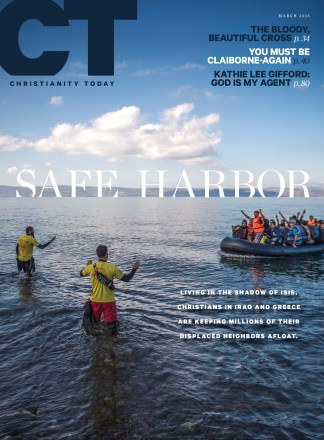We all have stories of getting lost. Here is one of mine: I crossed the Sahara one year on an expedition truck with 20 others, grinding and meandering from Cairo into the heart of Africa. We got lost often, once for three days, wandering farther and farther into the African bush with insufficient water, no GPS, and no people to point the way out. We were tense: we had to get off the earthen roads before the monsoon rains began. For most of those months, we were covered in dust, breathing through bandanas, praying we’d find the right path.
That’s one kind of “lost narrative.” Here’s another: As I write, I am on the brink of major life changes—some prayed for, a few drastic and unwelcome. I find myself stumbling, fearful, uncertain of these new snaking roads and unsure of God’s place in it all. Then I feel guilty. Where is my faith? Why am I not “counting it all joy” and skipping confidently into the sunny future?
A. J. Swoboda’s newest book, The Dusty Ones: Why Wandering Deepens Your Faith (Baker), came to my door at the right time. It is, of course, about the second kind of trek: our pilgrimage toward the city of God, with its painful desert crossings and wanderings. Swoboda (a pastor at Theophilus, a Portland church, and a teacher at George Fox and Fuller seminaries) has traversed this terrain before in books. The titles give the flavor—like Messy: God Likes It That Way and A Glorious Dark: Finding Hope in the Tension Between Belief and Experience. His lesson for weary travelers? It isn’t just sin and disbelief, but faith—even the stoutest, most persevering faith—that takes you off life’s straight and narrow road.
‘Called to Arrive’
Most believers have felt the urge to sing out, with a blush of guilt, “Prone to wander, Lord, I feel it, prone to leave the one I love.” This is the via negativa we most associate with wandering, and the Bible is full of characters who are traveling off-road: the Israelites in the desert trudging out their punishment for disbelief and rebellion. The Prodigal Son who left home for Sin City. Cain, whose punishment for murdering his brother was to wander the earth as a nomad. The psalmist’s plea to God is often ours as well: “I seek you with all my heart; do not let me stray from your commands” (119:10).
But as Swoboda reminds us, there is an equally biblical via positiva. Wandering is often required of those called to follow. Abraham was called to leave his homeland and journey wherever God took him. Jacob and Isaac did plenty of roaming after God. Hebrews 11, the “Hall of Faith” chapter, describes those who lived as “strangers and exiles,” who “wandered about in deserts and mountains” without receiving what was promised to them. Jesus himself was a wanderer, with no place to lay his head, who called 12 men to a nomadic life of healing and preaching.
We all want a life marked by straight paths, smooth roads, and victorious arrivals. But as Swoboda argues, wandering is “an inescapable theme of the Christian experience,” even if the church has often minimized and even ignored its inevitable role in every pilgrim’s progress.
A few decades ago, Campus Crusade urged its evangelists to comfort potential converts with the pronouncement that “God loves you and has a wonderful plan for your life.” At the Christian college I attended, we were often charged with discerning “God’s perfect will” for our lives, which implied that all would be pleasant and orderly if we simply followed it. These messages are still around, and not just among the health-and-wealth-ers. Many believers are still “addicted” to the American vision of success, progress, and happiness—and most of all, Swoboda contends, “to certainty, not faith.” Because of this, we’re very good, especially in church, at pretending that we know exactly what we’re doing. In reality, Swoboda writes, “we put our heads on our pillows at night knowing we’ve tricked the world into thinking something that isn’t true.” Can’t we be more honest about this weekly ruse?
The church does embrace one particular kind of wandering, however, as Swoboda notes with a confessed twinge of envy: the trendy bohemian types who jet off to faraway places doing radical things for Jesus—anything but settling down in the suburbs, raising kids, and joining the PTA. Against this mindset, he quotes G. K. Chesterton: “The most extraordinary thing in the world is an ordinary man and an ordinary woman and their ordinary children.” While we are all wanderers in some way, we are also called to be settlers.
If Swoboda has his way, we’ll retire “the journey” as our prevailing metaphor for the life of faith. With such an overplayed image, we can easily miss the purpose of our sojourn: reaching our destination. Even as wanderers, Swoboda writes incisively, “we are called to arrive.” He points to Paul’s entreaty to “press on toward the goal to win the prize for which God has called me heavenward in Christ Jesus” (Phil. 3:14). The goal is not the avoidance of all stumbling and uncertainty, but the pursuit of Christ himself.
‘Nothing Can Be Skipped Over’
As I began making my way through this book, I wondered: Do we really need another writer validating our spiritual frailty and gloriously messed-up lives? Personally, I’ve grown weary of this last decade’s relentless exultation of brokenness, which can read either like a catalog of excuses or a too-joyful grovel. But we should not resist Swoboda’s plea for honesty and authenticity, however familiar the message. Who among us has never pictured life as a ladder-graph, where time and age inevitably and happily lift us higher and higher on the rungs of achievement and success?
In this image-based culture, where so much time is spent polishing and crafting the just-right online persona, we need occasional reminders of the redemptive value of our own limp. Swoboda is right: the most powerful witness to Christ comes not from pretension or perfection but from “the wobbly, unsturdy, wandering life of a saved sinner who has denied and been welcomed back three times like the apostle Peter.”
In fact, my chief disappointment with The Dusty Ones is less theological than literary. Every book aims to take its reader on a transformative (yes, I have to say it) journey: from ignorance to wisdom, from lost to found, from chaos to order. Many quotable passages accomplish parts of this, but ultimately this treatise on wandering wanders too much. The book meanders from one subject to another, scattering asides and cultural critiques that sometimes feel only loosely connected. It reads, in fact, like a pastiche of sermon excerpts. We learn a lot about the author on these jaunts (sometimes more than we want). What’s missing, however, is a larger narrative that provides an overarching order and cohesion, propelling the reader gladly along the winding path and placing her within the meta-story of God’s great rescue of sinners.
Returning to my own story, our expedition truck arrived in Mombasa five months later, nearly on schedule. We beat the monsoon rains, but the trip was not just about getting there; it was about all the places we stopped along the way, even the places where we were miserably stuck. Every village, waterhole, and sandpit along the way had purpose and value. So it is with our lives—and with my own present struggles and wanderings. The Dusty Ones reminds us that “Christian spirituality is a slow train that must inevitably stop at every little Podunk town in our life—nothing can be skipped over.”
Maybe this is equally true of the book itself. While frustrating and repetitive at times, it at least supplements Swoboda’s own travelogue with some excellent company: Chesterton, C. S. Lewis, Henri Nouwen, Jürgen Moltmann, and Miroslav Volf, among many others. Through all these voices, we learn not to wander less, but to “wander with Christ.” As J. R. R. Tolkien reminds us, “Not all those who wander are lost.”
Leslie Leyland Fields is a CT contributing editor and the author of Forgiving Our Fathers and Mothers: Finding Freedom from Hurt and Hate (Thomas Nelson). She lives in Alaska, where she works in commercial salmon fishing with her family.











